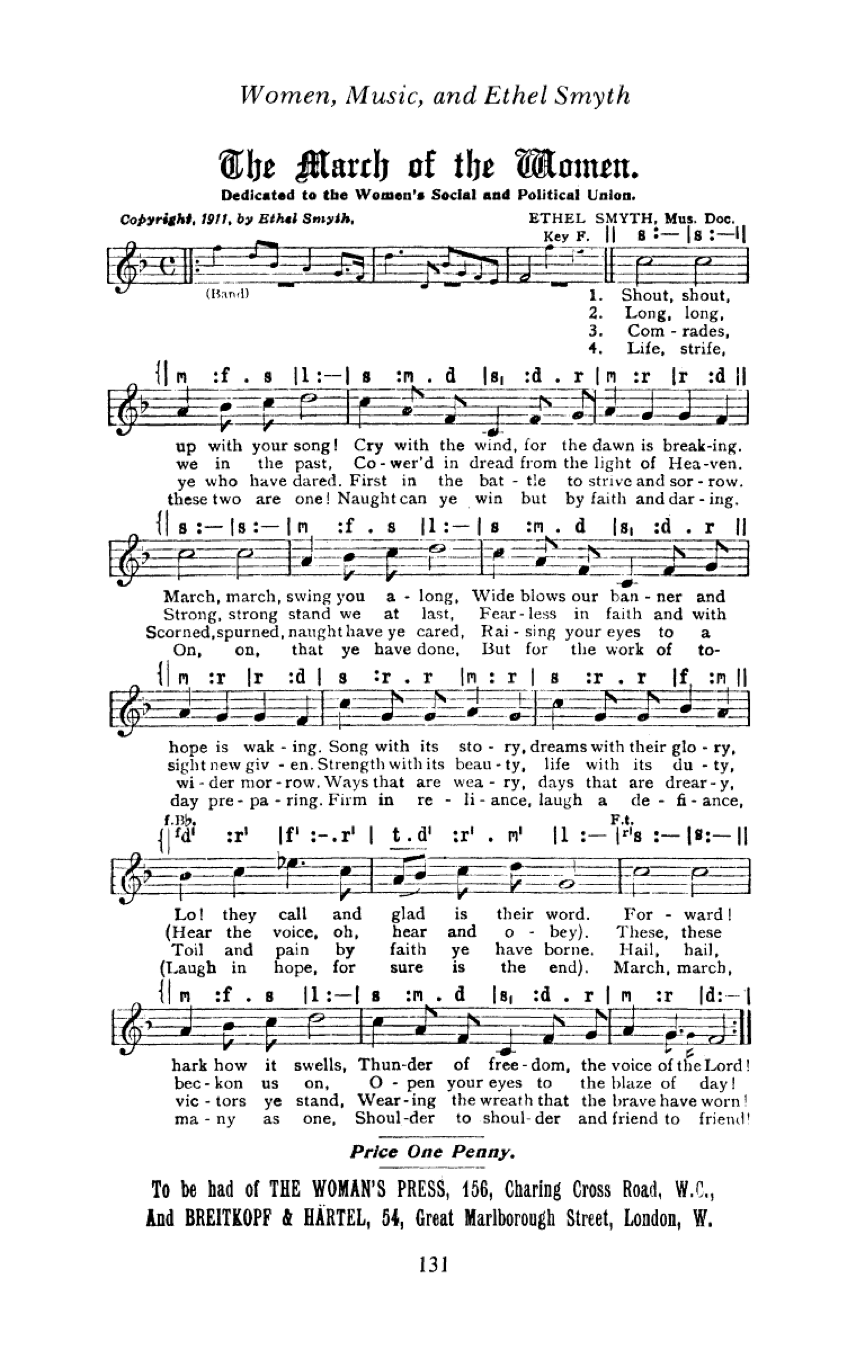Dame Ethel Smyth: Feminine/Feminist Composer
On March 12, 1903, the Metropolitan Opera staged its first-ever opera by a female composer: Der Wald, by Dame Ethel Smyth. There would only be two performances of Smyth’s opera at the Met. The first was presented alongside Il Trovatore with some of the most popular singers of the day, and the second, on March 20th, was staged alongside Donizetti’s La fille du regiment—staged in order to hedge bets that Dame Ethel would herself not pull in a large enough audience. In fact, both performances of Der Wald were a financial success and very popular; notably, the March 20th performance of La Fille sold more tickets than its previous staging alongside Pagliacci.
By 1903, Dame Ethel had earned the legitimate respect of her peers and had become a well-established and respected fixture in Leipzig circles. No small feat: Leipzig for composers in the 1890s was a white-hot center of musical creativity, competitive and scandalous. Composers, promoters, publishers, and royal benefactors and sponsors were all looking for the next big thing (and naturally, all hooking up with each other). Smyth arrived to this hotbed of intrigue as an essentially self-educated girl of seventeen, one of eight children in an unmusical, Victorian British family. And, oh yeah, she was a lesbian.[1]
It is incredible to imagine how at this time, a woman with no wealth, connections, or, well, the interest or wherewithal to seduce powerful men, would charm her way into the hearts of the great composers and benefactors of the time. She won over Mendelssohn (having become great friends with his daughter), Brahms (who with all of his womanizing and complicated relationships with women, championed her work and her talent), and the darlings of the Romantic era, Robert and Clara Schumann.[2] Furthermore, she proved her creativity and abilities at a time when women composers were relegated to hausmusik—entertaining and innocuous pieces meant for after-dinner performances on the pianoforte in the parlor. Smyth defied the limitations of what was appropriate for women to compose, and she would go on to write no less than six operas and a number of works for chorus, orchestra, and ensemble performances. In addition to her musical career, Smyth was a powerful supporter of the suffragist movements in Britain and the United States. She wrote four books, a number of essays, and summarily won the hearts and minds of some of the most creative, powerful and influential artists and leaders of her generation. During the famous window-smashing campaigns of the British suffrage movement in 1911, she was arrested for breaking the window of Lewis Harcourt, the Secretary of State for the Colonies. Scholar Elizabeth Wood writes: “The conductor Thomas Beecham painted a memorable scene of his visit to Ethel in prison, and wrote that she conducted a chorus singing her War Chant, ‘The March of the Women’ from between the bars of her jail cell window, beating time with a toothbrush.”[3] This war chant was one of Smyth’s most loved works.

Dame Ethel Smyth’s March of the Women (image from Elizabeth Wood’s “Women, Music, and Ethel Smyth: A Pathway in the Politics of Music”)
Her sketch was drawn by John Singer Sargent; she was a lover and dear friend of Virginia Woolf. Yet, we know almost nothing about her as a composer, and her works have been all but abandoned. Why?
Despite her popular reception, the adulation of her peers, and her career success, the critical reception of Dame Ethel’s music has been overwhelmingly negative. Music critics in America were dismissive of Der Wald. The New York Times referred to it as a “disappointing novelty” while also reporting that the opera garnered one of the most brilliant receptions of the season. What becomes fascinating, however, is the struggle of each critic to articulate just what exactly is wrong with Smyth’s music. Each response is ultimately an attempt to describe what is intrinsically lacking in a feminine brain that renders her incapable of producing music worth listening to. Some critics felt the piece was overly emotional—a very feminine flaw indeed. Others said that it lacked tenderness—the inability to elicit an emotional response is a failure of femininity. There is some admission that Dame Ethel has masculine abilities of logic and organization, which are, perhaps, misplaced.
The following excerpts are taken from an article by John Yohalem, assembled from the Metropolitan Opera Archives:
The Telegraph: “This little woman writes music with a masculine hand and has a sound and logical brain, such as is supposed to be the especial gift of the rougher sex. There is not a weak or effeminate note in Der Wald, nor an unstable sentiment.”
The World: “Her work is utterly unfeminine. It lacks sweetness and grace of phrase. Wagner was never so ruthless in his treatment of the human voice.”
The Daily Mail: “The charm and quaintness of it will appeal more than its attempt to mirror intense human emotion and to this extent it is feminine, according to all tradition.”
The Commercial Advertiser: “It has been often and truly said that whenever a woman composer strives to take the sex element out of her work if she succeeds she surpasses in masculinity anything that a man might do. Miss Smyth seems to have worked chiefly with this end in view, but, while she has eliminated the feminine element from her music, the gentleness and sentimentality which one would expect to find in the work of a woman, her substitute is far from having the real masculine flavor. Her moments of passion become moments of blatant noise….”
The New York Times gets to the heart of the argument: “The case is one of vaulting ambitions and a general incompetency to write anything beyond the most obvious commonplaces. It is quite lacking in dramatic expressiveness in characterization, in melodic ideas, in distinction of any kind…. it is entirely unconvincing, and exhibits neither passion nor tenderness…”
So. Women are, by nature, emotional, but they are incapable of expressing this through art. Any emotion that is expressed is a “feminine” one, charming but unsubstantial. Although contemporaneous criticism displays the gender biases of Dame Ethel’s time, more recent criticism is rare. During her later years, she found it more and more challenging to find venues and promoters who would take a risk on her compositions. Her work all but ceased to be performed after her death, and her published compositions are very difficult to track down, even in the United Kingdom—outrageous and unprecedented treatment for a Dame Commander of the Order of the British Empire (She was awarded her DBE in 1922 and was the first female composer to be awarded a damehood).
Enter Cantori New York, a chamber chorus (of which I am a member) with a 30-year tradition of performing neglected works by classical composers as well as new pieces by emerging composers. On May 14th and 15th, Cantori New York, under the artistic direction of Mark Shapiro, will perform one of Dame Ethel’s final compositions, The Prison, written in 1929-1930 (shortly before her death). It is Maestro Shapiro’s understanding that this will be the first performance of The Prison ever performed in the United States.
The piece was composed for orchestra, soloists, and chorus. Other than that—opera geeks will get annoyed with me for this—I can’t really categorize the structure of this piece for you. It has one act, but it is not quite long enough to be an opera, so some might consider it an oratorio, although these are typically static, more rigid musical narratives. It’s a bit like a cantata, but the story is not a parable or a religious text. The composition is utterly modern, beyond characterization, much like Ethel herself. Incredibly, by the time she wrote the piece, she was almost completely deaf. Shapiro, who has conducted other works by Smyth and has dubbed this piece a “Vocal Symphony,” received the score as a gift from historian Elizabeth Wood.
The libretto for The Prison was written by the writer and philosopher Harold B. Brewster, Ethel’s most stalwart supporter and mentor. He was infatuated with her, but their relationship was one of chaste friendship. Smyth did have a number of passionate love affairs, most of them with women, including Virginia Woolf, who exchanged many letters with Ethel during her composition of The Prison.[4] Smyth was, in turn, very fond of Brewster’s sister-in-law. It was a rather messy love triangle, complicated by Ethel’s own romantic drama with some pretty high profile women, including Virginia Woolf. Brewster passed in 1908, over 20 years before The Prison was composed, but the poetry speaks vividly to Smyth’s place in her life at the time. In the piece, the “prisoner” is one only in the metaphorical or Platonic sense, a man in dialogue with his soul. How does one bring theater to an internal dialogue? Is there drama in philosophical inquiry? The answer to this challenge in The Prison, I believe (and I realized I’m biased) is in the chorus.
If you’ve been to a great big fat exciting classical opera production, you are used to seeing the chorus play a specific function—the choir is part of the background, merely a vehicle to move the action along and to accentuate the drama played out between soloist main characters. The chorus is usually a big mess of townspeople running around, or an angry mob, or maybe a bevy of gossiping, tittering ladies helping someone get into her ballgown. I’ve been a part of the chorus for a few opera performances, and they’re lots of fun—the choral music itself, however, is rarely challenging or interesting to a singer, other than being high or loud for a long period of time for dramatic effect.
Ethel Smyth had a different idea in mind for her chorus. The choral part is intricate and complex. Each of the parts speak to each other, give and take, in layers, in a dynamic and shifting foundation. We change keys and time signatures, guiding the soloists in the discussion between the Prisoner with his Soul. Our rehearsals of this piece have involved hours of work practicing our lines as if they were a conversation, lower parts singing a line that complements but is a different idea than the sopranos sailing above. The chorus in this “cantata” has its own distinct character and a mind of its own, the intent being to both complement and complicate the dialogue between a person and their soul. This piece is challenging and surprising, to the extent that it is nearly exhausting (again, like our dear Dame).
In 2016, how do we now view the work of the female composer? It has taken over 100 years for the Met to present another opera by a woman, the Finnish composer Kaija Saariaho’s ethereal L’Amour de Loin, which is one of the most acclaimed operas of the 2000s. The response of the composer, when questioned about the gap, is that the scene is still “evolving.” Dame Ethel had a point of view in her own century, that Elizabeth Wood reflects on today.
The arts, she held, remained the hardest for women to conquer: in the arts there are no rules, only chances to be given or withheld. In the past, women adopted anonymity or male pseudonyms; “only queens and saints were accorded greatness because men could afford to give them a free hand without loss of dignity to themselves.” Many women, she found, to practice their art had resorted to “songs and seduction.” To being a “man’s woman,” and were thus kept in their place.[5]
Dame Ethel spoke often of the “machine” that kept women’s art suppressed. It wasn’t one or two people, critics, or publishers, it was a system of schools, institutions, promoters, concert halls and venues; many factors prevent women’s art from ever seeing an audience. To not only experience Dame Ethel’s music in this century, but to perform it for me personally, is a defiant act against a system who shut her out and deprived so many listeners from enjoying and being inspired by her magnificent work. My hope is that we will hear more of her in years to come.
[1] Wood, Elizabeth. Interview by Thomasin Bentley. Personal interview. By telephone, April 5, 2016.
[2] Ibid.
[3] Wood, Elizabeth. “Women, Music, and Ethel Smyth: A Pathway in the Politics of Music.” The Massachusetts Review, Vol. 24, No. 1, Woman: The Arts 1 (Spring, 1983), p.130
[4] Wood, Elizabeth. Interview by Thomasin Bentley. Personal interview. By telephone, April 5, 2016.
[5] Wood, Elizabeth. “Women, Music, and Ethel Smyth: A Pathway in the Politics of Music.” The Massachusetts Review, Vol. 24, No. 1, Woman: The Arts 1 (Spring, 1983), p.132



Dilettante Mail
Get updates from us a few times a year.